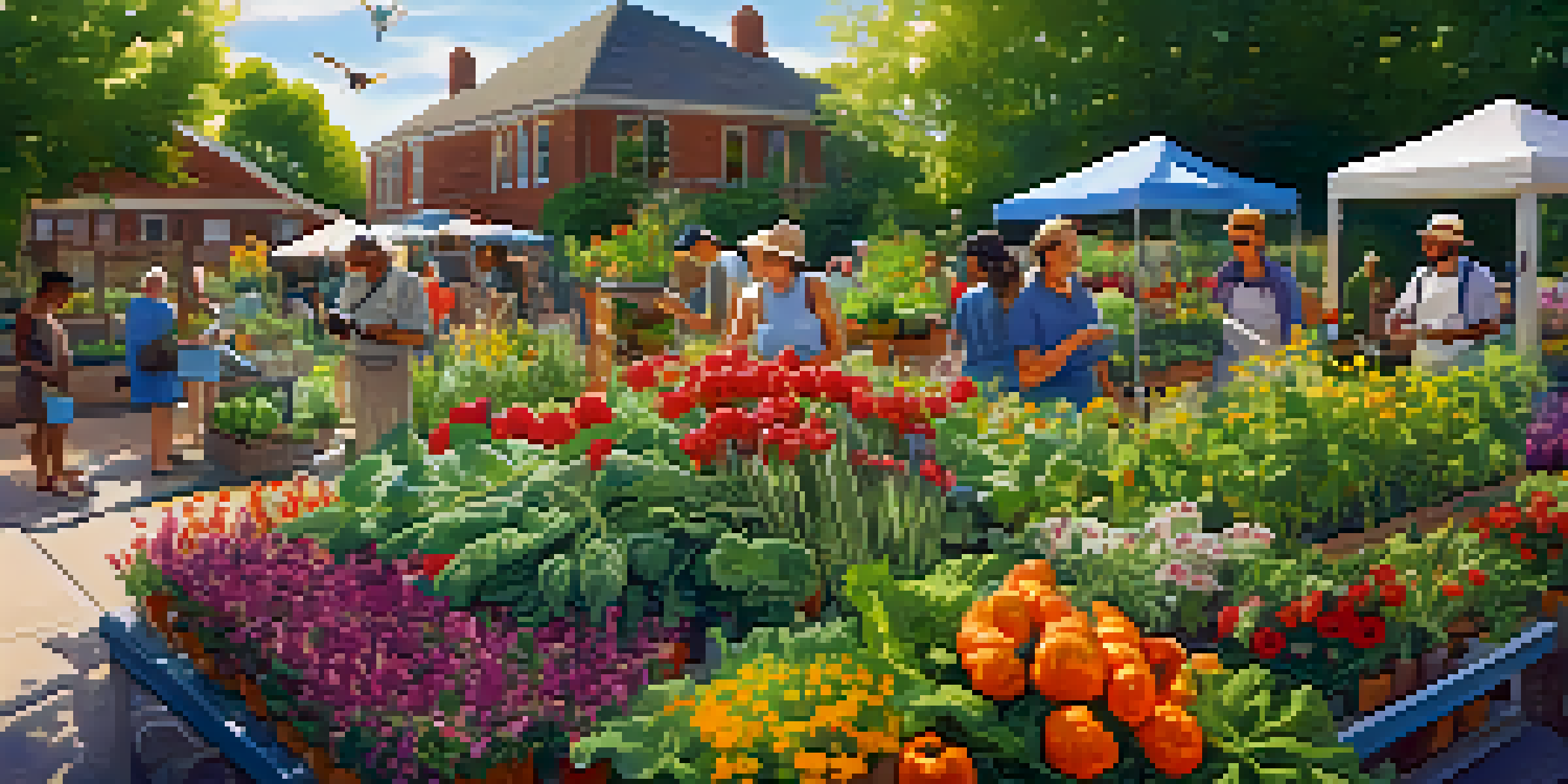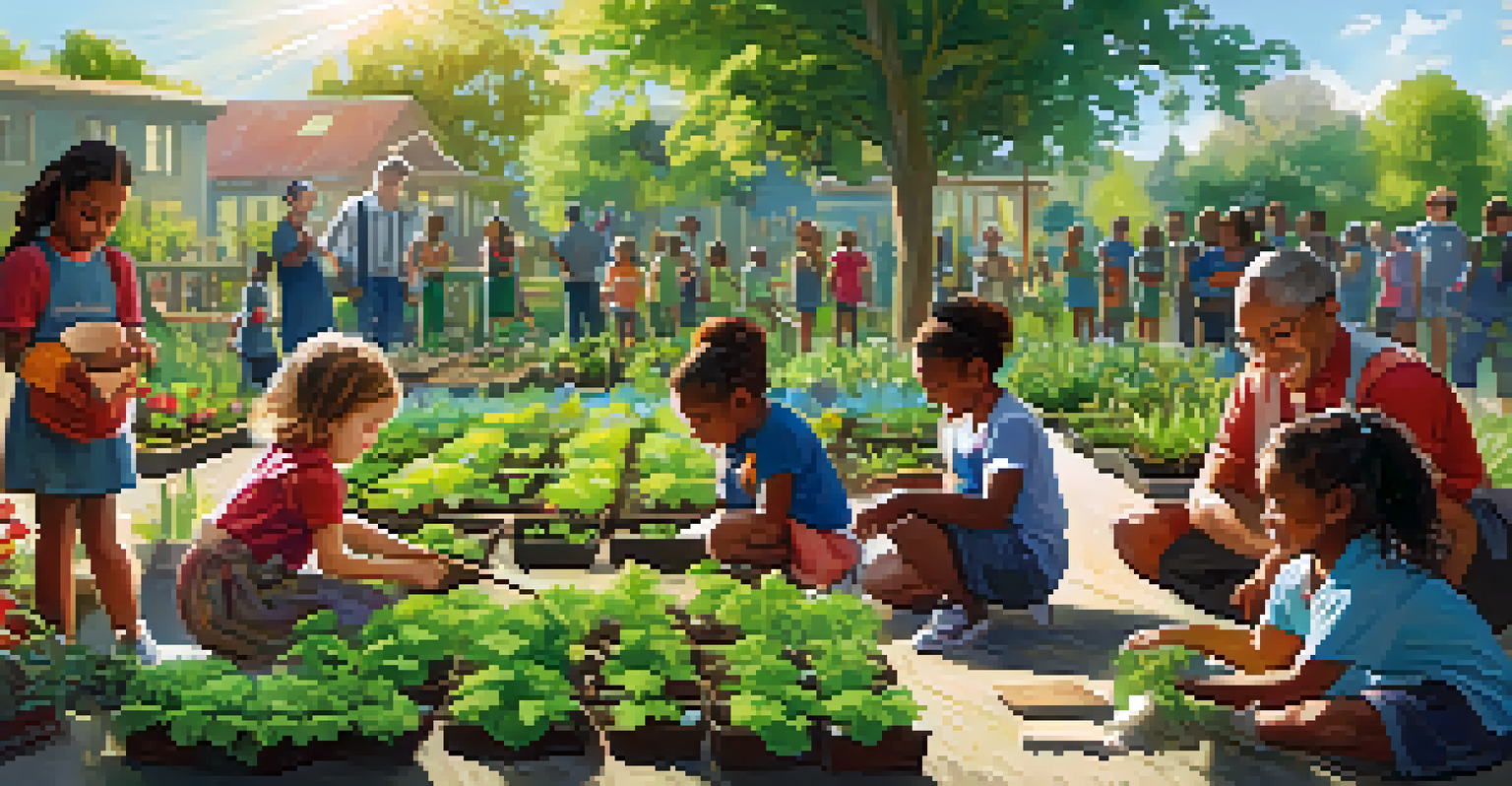Promoting Biodiversity and Health Through Community Gardens

The Role of Community Gardens in Biodiversity
Community gardens serve as vital green spaces that foster biodiversity. By creating habitats for various plant and animal species, these gardens contribute to a healthier ecosystem. For instance, a well-planned community garden can attract pollinators like bees and butterflies, which are essential for plant reproduction.
Gardening is a way of showing that you believe in tomorrow.
Moreover, diverse plant species in community gardens can improve soil quality and reduce the need for chemical fertilizers. This natural approach helps maintain the balance of local ecosystems while promoting sustainable gardening practices. Imagine a garden bursting with colors, where every flower plays a role in supporting life around it.
Ultimately, community gardens are not just about growing food; they are about cultivating entire ecosystems. By encouraging a variety of plants and wildlife, these gardens help maintain the delicate web of life that supports us all. This biodiversity is crucial for resilience against pests and diseases, benefiting both the garden and the surrounding environment.
Health Benefits of Gardening in Communities
Gardening has long been known to offer physical health benefits, but its advantages extend far beyond just exercise. Engaging in community gardening can significantly improve mental well-being, providing a therapeutic outlet for stress and anxiety. Picture a group of neighbors laughing and sharing stories while planting seeds together—it's a perfect blend of activity and social connection.

Additionally, growing your own fruits and vegetables can lead to healthier eating habits. When individuals see the fruits of their labor, they are often more inclined to taste and enjoy fresh produce. This not only enhances nutrition but also fosters an appreciation for the food we consume.
Community Gardens Boost Biodiversity
These gardens create habitats for various species, enhancing local ecosystems and promoting sustainable practices.
Moreover, community gardens promote social cohesion, bringing people together from diverse backgrounds. This sense of community creates a support system that encourages both personal and collective growth, making everyone involved feel valued and connected. In essence, these gardens cultivate not just plants, but relationships and community spirit.
Creating Sustainable Urban Spaces
Community gardens play a crucial role in transforming urban areas into sustainable environments. By utilizing vacant lots and underused spaces, these gardens can reduce urban heat and improve air quality. Think of them as little green lungs that breathe life into concrete jungles, providing necessary relief from the urban sprawl.
The best time to plant a tree was 20 years ago. The second best time is now.
Additionally, community gardens can help manage stormwater runoff, reducing the risk of flooding. The plants and soil in these gardens absorb rainwater, minimizing the burden on drainage systems. This eco-friendly approach not only benefits the garden but also the surrounding community by creating resilience against climate change.
As cities grow, the importance of integrating nature into urban planning becomes increasingly clear. Community gardens are an effective way to enhance urban environments, making them more livable and enjoyable for residents. They invite nature back into our lives, reminding us of the importance of green spaces amid urban development.
Educational Opportunities Through Gardening
Community gardens also serve as fantastic educational platforms for people of all ages. They provide hands-on learning experiences about gardening, nutrition, and environmental science. For children, this can mean planting seeds and watching them grow, instilling a sense of responsibility and understanding of nature's cycles.
Workshops and programs hosted in these gardens can teach valuable skills, from sustainable gardening techniques to cooking classes that highlight healthy eating. For example, participants might learn how to make a delicious salad using freshly harvested ingredients, bridging the gap between growing food and enjoying it.
Gardening Enhances Mental Health
Engaging in community gardening offers therapeutic benefits, reducing stress while fostering social connections.
Moreover, these gardens can foster a sense of stewardship towards the environment. When individuals understand the impact of their actions on nature, they are more likely to engage in environmentally friendly practices. Community gardens, therefore, act as a catalyst for environmental education and advocacy, empowering people to make positive changes in their own lives.
Fostering Community Resilience and Food Security
One of the most significant impacts of community gardens is their ability to enhance food security within neighborhoods. By growing food locally, communities can reduce their reliance on distant food sources, paving the way for sustainable practices. Imagine a neighborhood where fresh vegetables are just a short walk away, promoting both health and accessibility.
These gardens can also be a source of fresh produce for those who might not otherwise have access to it, particularly in food deserts. They can help combat hunger and malnutrition, making a real difference in the lives of community members. Local food initiatives often spring from community gardens, creating a ripple effect of nutrition and wellness.
Furthermore, community gardens can build resilience against economic challenges. During tough times, having access to homegrown food can alleviate financial burdens, allowing families to stretch their budgets. In this way, growing food together not only nourishes bodies but also strengthens communities against adversity.
Promoting Mental Well-being Through Nature
The connection between nature and mental health is well-documented, and community gardens offer a perfect way to harness this relationship. Spending time in nature has been shown to reduce symptoms of stress, anxiety, and depression. Just imagine the calming effect of tending to plants and being surrounded by greenery—it’s like a natural therapy.
Community gardens provide a space for individuals to escape the hustle and bustle of daily life, encouraging mindfulness and relaxation. Engaging in gardening tasks can be meditative, allowing people to focus on the present moment and forget their worries. This simple act of nurturing plants can lead to profound mental clarity and peace.
Local Food Security Through Gardens
Community gardens improve access to fresh produce, combat food deserts, and strengthen resilience against economic challenges.
Moreover, the social aspect of community gardening enhances emotional well-being. Building friendships and sharing experiences with fellow gardeners creates a sense of belonging and support. Together, they cultivate not only plants but also a welcoming environment that fosters mental health and resilience.
Inspiring Future Generations of Gardeners
As we look to the future, community gardens have the potential to inspire new generations of environmentally conscious individuals. By involving youth in gardening activities, we can instill a love for nature and sustainable practices early on. Imagine children learning about where their food comes from, sparking curiosity and a desire to protect the environment.
These gardens can serve as outdoor classrooms that teach essential life skills, from teamwork to responsibility. Children and teens often develop a sense of pride in their contributions, which enhances their confidence and self-esteem. This foundational knowledge can lead to a lifelong interest in gardening and environmental stewardship.

Ultimately, by nurturing young gardeners today, we are planting the seeds for a healthier, more sustainable future. Community gardens empower youth to take an active role in their environment, ensuring that the values of biodiversity and health are carried forward. Together, they can grow a greener world for generations to come.